Killing it With Casuals: Abercrombie & Fitch’s Marketing During Coronavirus
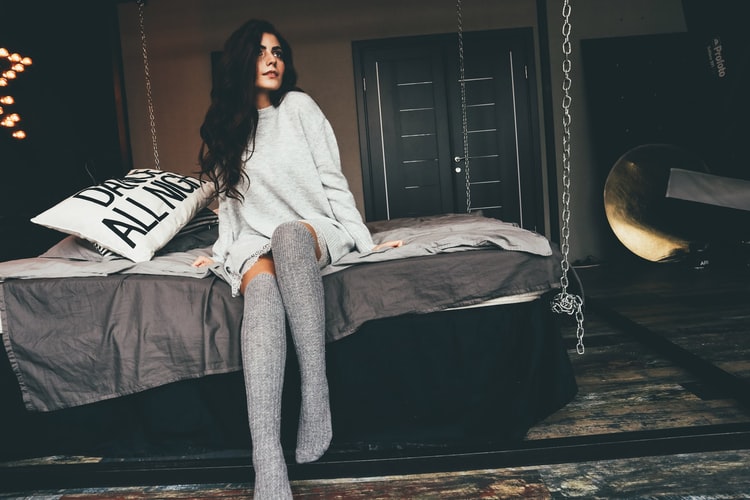
Learn how Abercrombie & Fitch pivoted their marketing and buying strategy to bring comfort to customers during lockdown (and kept sales healthy).
While the reality of being back in lockdown has many businesses in despair, Abercrombie & Fitch might not be one of them. That’s because the fashion brand chalked up a net profit of $5.5 million in the second quarter of 2020 – the very period the high street was closed.
The result was an astounding turn around for the retailer, which only months earlier reported an annual loss of $31.1 million. So, how did Ambercrombie & Fitch flourish during lockdown while other fashion brands floundered? The answer is casuals.
According to Abercrombie & Fitch, increased demand for hoodies and comfy clothing for wearing around the house led to the growth in profit. But it wasn’t just luck that made the quarter so successful for the brand; Abercrombie & Fitch’s marketing strategy also played a big role.
Upon noticing the quickly growing trend, the retailer moved purchasing and began heavily promoting casuals to capitalise on the demand. “Casual clothes are in our DNA,” Chief Exec Fran Horowitz told the Financial Times “But we did pivot into some more cosy, casual clothing as a percentage of our business.”
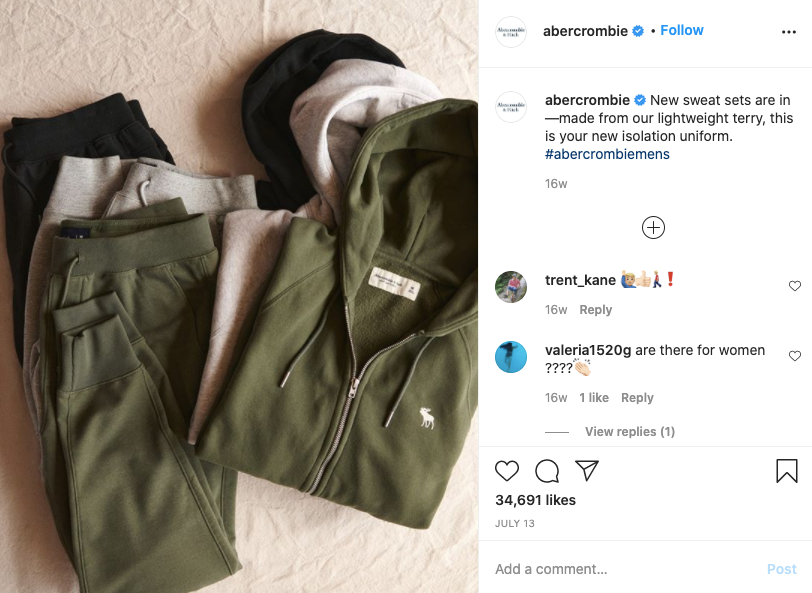
Abercrombie & Fitch switch up their marketing strategy
The ability to be able to respond to market trends quickly has been a saving grace for many businesses during the pandemic. While not strictly a fast-fashion brand, Abercrombie & Fitch have shown they’re agile enough to switch up both their product range and their marketing when they see an opportunity.
As UK Google Trends data shows, people searching for loungewear shot up dramatically between March and April, when the country first went into lockdown. Data for the US shows a similar trend.
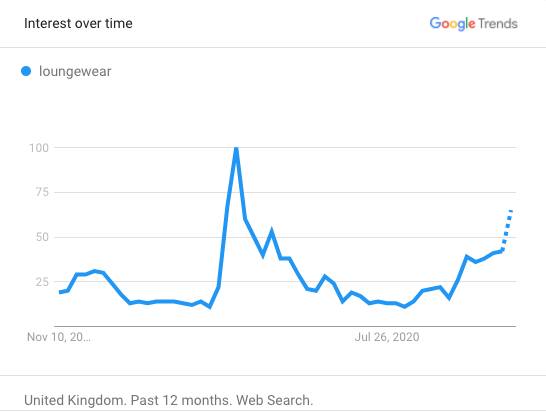
As people got used to not leaving the house for work or school, they started looking for comfier attire better suited to their new lifestyles. Our own research shows that during lockdown, nearly 52% of UK consumers purchased new loungewear or casual sportswear like yoga gear and sweatshirts. And as lockdown 2.0 gets underway in the UK, online search traffic for comfy clothing is going up once again.
As a brand already known and loved for its hoodies and casuals, Abercrombie & Fitch realised they were uniquely placed to help see people stuck indoors through the pandemic. They quickly pivoted their marketing to provide customers with quarantine inspiration and motivation that they could enjoy from home – all while wearing their Abercrombie sweats, of course.
Initiatives included In the Living Room, Abercrombie & Fitch’s first-ever Instagram IGTV series, featuring expert tutorials for things to try at home, like cocktail making or ballet. The concept was well-received – during March, Abercrombie & Fitch’s Instagram account was gaining around 15,000 new followers every week.
A second IGTV mini series followed in the summer, A&F Conversations, focusing on honest conversations about social justice and other topics that are important to A&F’s customers. And in October, Abercrombie & Fitch teamed up with World Champion American soccer player Megan Rapinoe (recently named one of Time’s 100 Most Influential People of 2020) for a
a seven-part interview series dedicated to mental health, body positivity and wellness.
“Through this series, we are incredibly proud to bring conversations about mental health to the forefront, as it is a topic that is extremely important to us and our customers,” said Carey Krug, SVP of Marketing at Abercrombie & Fitch.
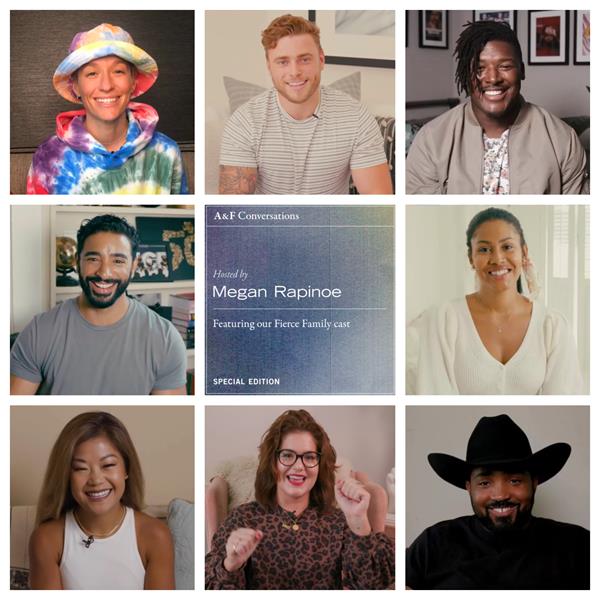
Abercrombie & Fitch turns to TikTok
As well as leveraging Instagram during the pandemic, Abercrombie & Fitch have ventured over to video sharing platform TikTok. TikTok broke download records during lockdown – and it’s proved especially popular with the younger demographic (especially teens), who make up the core customer base of Abercrombie & Fitch sister brand Hollister. So it was a savvy move for the retailer to partner with TikTok stars Charli and Dixie D’Amelio and Noah Pugliano for a Hollister back-to-school campaign.
Our data shows that even after the initial lockdown, TikTok continues to enjoy a notable increase in use from those aged 18-40. Nearly 21% of UK consumers in this age bracket say they have been spending more time on TikTok recently. What’s more, 18.2% say they interact with brands when they’re on there.
The Hollister TikTok campaign saw Charli, Dixie and Noah become the brand’s “Jeanealogists”, together with TV science educator Bill Nye. The trio’s “experiments” in Hollister’s Jean Lab determined the science behind the brand’s perfect denim fits. The partnership also included the launch of a TikTok challenge – #MoreHappyDenimDance, encouraging customers to share their “happy dance” when they slip into the perfect pair of Hollister jeans. The challenge included the chance to win a virtual meet-and-greet with Charli and Dixie.
And it looks like Abercrombie is making a commitment to TikTok. Kristin Scott, President, Global Brands at Abercrombie & Fitch, said: “This is the start of a longer-term relationship with Charli and Dixie, both of whom share our passion to spread positivity and build confidence among teens – especially during the uncertainty that surrounds this year’s back-to-school season.”

Upgrading the digital customer experience
With people unable to shop in-store, Abercrombie & Fitch have sought to upgrade their digital shopping experience. One way they’ve done this – which has also allowed them to capitalise on increased social traffic – is by introducing a purchase option within Instagram.
Customers can now shop on the platform by tapping items in a post, which directs them to a specific product page. From there, users can opt to “proceed to checkout” and complete their purchases without ever leaving Instagram. They can also receive shipping and delivery notifications through the app.
The move follows a partnership with Klarna that allows Abercrombie & Fitch customers to pay in installments. The functionality has been integrated into all of the retailer’s e-commerce sites, giving shoppers the option to pay for their purchases in four bi-weekly installments
Speaking about the upgraded user experience, Matt Weger, CIO at Abercrombie & Fitch said: “Our customers are the center of everything we do, and a forward-thinking approach is crucial when it comes to ensuring our brands evolve with our customers.
“We are excited to provide an enhanced, seamless checkout experience with expanded payment options through our partnership with Klarna. It hits the mark for what our customers need.”
And while net sales in the second quarter dropped 17% due to the forced closure of brick and mortar stores, the outcomes were much better than anticipated – digital sales rose 56% on the previous year.
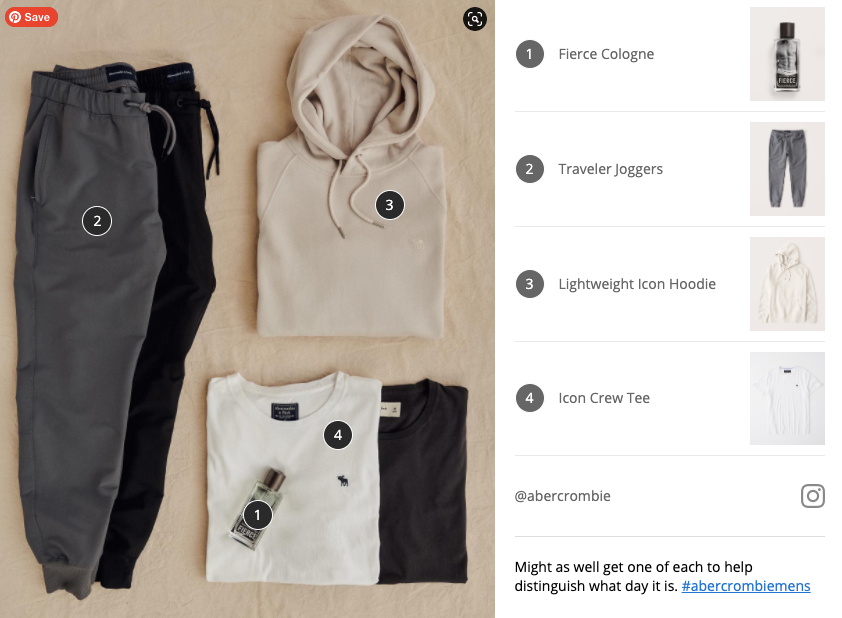
Abercrombie & Fitch’s marketing hits the sweet spot
Abercrombie & Fitch has been repositioning its brand for a number of years now; moving away from the naked torso image of the early 2000s. But, while the retailer had already committed to diverse and inclusive advertising before coronavirus, it feels as if the pandemic has helped Abercrombie to solidify its new identity.
The brand’s products and marketing have come into alignment at just the right time, offering people the comfortable casuals they love along with the positive and inclusive messaging they need. With this combination, Abercrombie & Fitch is absolutely hitting the sweet spot.
What do consumers want from your brand right now? Attest gives you access to insights from 100 million consumers in 46 markets. Learn more.
Tell us what you think of this article by leaving a comment on LinkedIn.
Or share it on:
